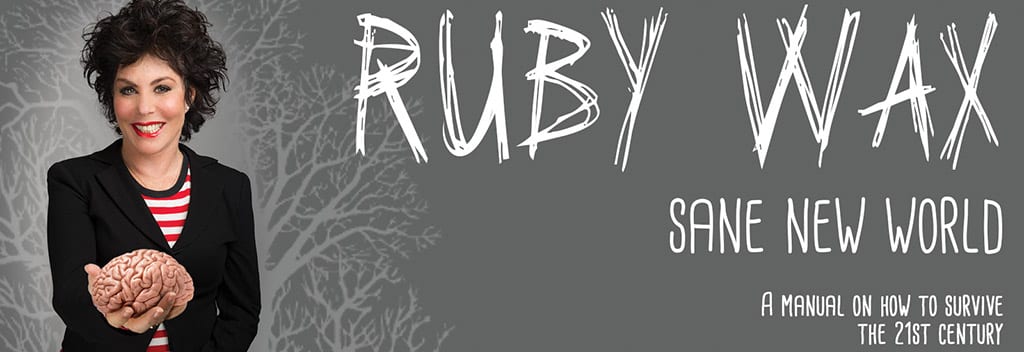One no longer has grown to expect the crass, red-headed cliché of all things American, when considering the much loved Ruby Wax. Consequently, in her latest show, Sane New World, based on her book of the same title, I knew little what to expect, except that this would likely be a frank and honest insight into her own personal battles with her mental health, in the vein of her 2010 show Losing It, that hover beneath the surface of the confident performer.
Wax is careful to remind us that this is not a show about her depression (“that was the last one!”, she sardonically quips), but instead about the multitude of bad news that deluges each of us from all sides and the critical inner narratives that plague all attempting to survive the 21st Century (though are amplified in the one in four of us who suffers from a mental illness).
Informed by her 2013 graduation from Kellogg College at Oxford University with a master’s degree in mindfulness cognitive therapy, Wax provides a unique insight into the realms of the mind, giving a accessible outline of the neurological factors that contribute to rising levels of stress that characterise this age of self-criticism.
Wax sidles onto the stage, stylishly set with a turfed chaise-long covered with replicas of the blue and white cushions that she bought in bulk during a previous bout of depression, with characteristic ease. She sits in silence as we hear the customary reminder to turn off all mobile phones and other beeping devices. As we are then warned against the use of videography, Wax takes out her phone and turns the camera on us, an act met with much laughter. Here it is: this promises not to be a run-of-the-mill self-help show (a format that she self-professedly loathes), but will be consistently marked by the adroit wit and perspicacity that brought her to fame.
With accompanying animations on a large screen behind her and scribbled questions appearing on a smaller screen to her right, including the frank “Why are we screwed?”, Wax blends her advice on how to navigate this hectic world, making small changes in our attitude and approach to thinking, with the anecdotes that pervade her previous solo, stand-up shows.
In light of this, I increasingly felt as if this is show that doesn’t quite know what it is: is this a TED-esque lecture or an out and out stand-up routine? The comedy sometimes distracts from her point, contributing to an unclear overarching message. And, without her brash character to hide behind, Wax seems off the pace, sometimes floundering for her words, sometimes missing the consistent comic-timing that has marked her career. No doubt there are moments of brilliance, however, laughs ringing around the audience, Wax tapping into something that is common to us all.
Following the interval we are invited to a question and answer session, propelling Wax back to her best. This is a woman adept at thinking on her feet and intensely sharp when caused to improvise. The questions have in common an emission of thanks for Wax, a pioneer in bringing mental health to the fore of contemporary discourse, and also provide opportunity to observe the diverse demographic that she attracts. Wax, a hugely popular and undoubtedly charismatic figure, comes bearing an important message for us all.
Wax closes with her uproarious version of “twerking” to Shakira’s “Waka Waka (This Time for Africa)”, marking a hugely endearing self-deprecation. She deserves her standing ovation for her brilliant career and the talent that she has exhibited time after time. But even more so for the frankness and honesty with which she talks about her own mental health. I, for one, will certainly bear in mind her message and use it to tame the chaos that comes from all sides.

